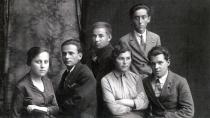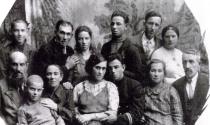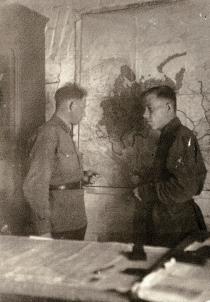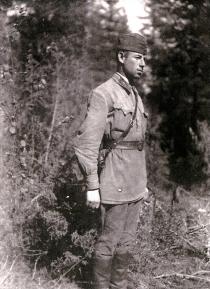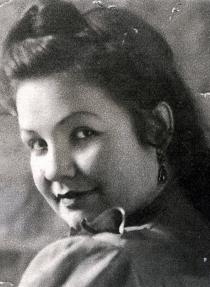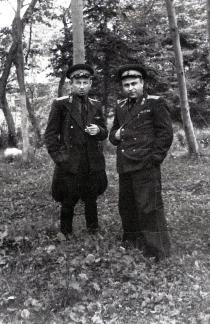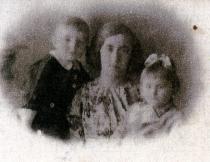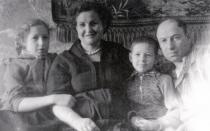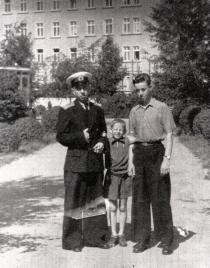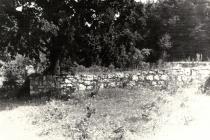This is a picture of our family. In the upper row (from left to right) are my nephew Yasha, my sister's husband Pynia, my sister Etl and me. In the lower row are my father David Sirotta, my nephew Misha Sirotta, my mother Sarrah Sirotta, my brother's wife Fira and my brother Yasha Sirotta. The photo was taken in Nova-Ushytsya in 1937, when our family got together to celebrate the arrival of my brother Yasha.
My parents were very religious. They only spoke Yiddish, although my mother knew Ukrainian well, and a little Russian and Polish. My father also knew Ukrainian because he had to communicate with Ukrainian farmers. We strictly observed all Jewish traditions. The only thing where my mother took liberties was that she didn't wear a shawl. She had thick and very beautiful hair. My father always wore a cap in the summer and a hat in the winter. On Fridays my mother changed her clothes and lit two candles in silver candlesticks. Of course she covered her head during the prayers. She said a prayer quietly and sort of embraced the flames of the candles with her hands. My father usually returned late from work, but on Fridays he came back earlier to go to the synagogue. After he returned my mother served our dinner. My father said a prayer, praising the Lord, blessing the Holy Saturday and the food, and afterwards we all had dinner. My mother cooked food for Saturday and put it in the oven to keep it warm. On Saturday my parents rested or went to see relatives and friends. We, children, played in the yard.
The brightest memory of my childhood is my sister Etl's wedding. She got married in 1922. Her fiancé's name was Pynia. He worked as a tobacco cutter at the tobacco factory in the town of Kahles [28 kilometers from Zemikhovo]. This factory still exists. It manufactures the Podoliye cigarettes. The wedding took place in our house in Zemikhovo. It was a traditional Jewish wedding.
After the wedding my sister moved to Pynia's parents' in Kahles. She gave birth to two boys: Yasha in 1924 and Misha in 1928. Yasha was a very musical boy. He played string instruments wonderfully. He could have become a great musician, I'm sure. As for the second boy, he liked reading and making things. Yasha and Misha treated both old and young people with great respect. They were handsome and good-mannered boys. Etl, her husband and their sons were killed in the ghetto in Nova-Ushytsya.
My younger brother, Yasha, finished a secondary school in Nova-Ushytsya in 1930 and entered the Pedagogical College in Kamenets-Podolsk. Later he worked as a teacher in a village school in Varyninskiy district in the former Kamenets-Podolsk Region. He married a Jewish woman. Her name was Fira. He rarely visited us. In 1933 he joined the Red Army and served in the Pacific Navy. He was even awarded the Red Flag order. Yasha remained in Liepaya, in Latvia, where he had served in the Navy. He was a history teacher at the Pedagogical Institute. In 1963 he lived through a terrible tragedy. He had two daughters, Larissa and Mirrah. They both studied in Riga. On New Year's Eve they were victims of a plane crash, which occurred when the plane was landing. My nieces died along with many other people. Yasha moved to Israel in 1990. He lived there for four years. He died of a heart disease in 1994. I received a letter, which said that he had been buried in accordance with all Jewish traditions. His son, Misha, who is a colonel and engineer, lives in Israel.

